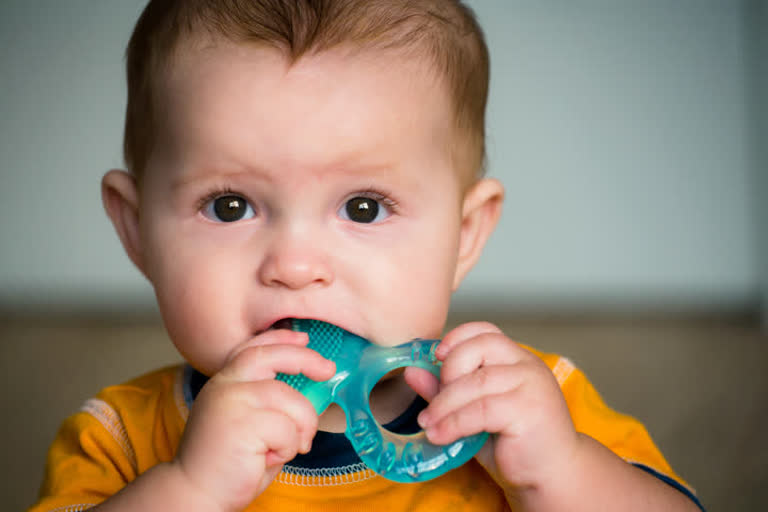Teething in babies is the process when the first set of teeth start erupting through the baby's gums, allowing them to gradually switch from a completely liquid diet (breast milk) to solid foods. Consumption of solid foods is important for healthy nourishment as the baby grows up. Dr. Srinivas Namineni, MDS and Consultant, Pediatric Dentistry, Rainbow Children's Hospital, Hyderabad says, “Teething usually starts between the age of 6-18 months of age. However, parents need to consult a pediatric dentist if teeth don’t erupt even after 18-20 months. In such cases, there may be a formation problem, or they may be genetically missing. Either tooth doesn’t form well, or they don’t form at all”.
Neonatal Teeth
Teething can be a difficult phase in a baby’s life and sometimes, as Dr. Srinivas explains, there can be a premature eruption of teeth in the baby, i.e. the teeth are present at birth. These are known as Neonatal Teeth and depending upon the condition, it is decided if it is to be removed or not. The most common problems that can be faced in this condition are:
- Problems faced by mothers while breastfeeding
- The tooth is loose and hanging
- The baby may have an ulcer underneath the tongue
In these three cases, the tooth may require extraction but a new set of teeth develop with age so parents need not worry about it.
Teething Troubles
Dr. Srinivas further explains that teething is a natural process and it is the first tissue that widely varies from others, being the hardest part of the body. A set of bacteria naturally exist on the teeth and once the teeth erupt, the bacteria start to colonize in the mouth. Sometimes, the baby’s body does not accept the bacteria and certain natural reactions may be noted like swollen gums, irritability, slightly higher temperature, etc. Babies also start chewing on other objects, which if contaminated, may cause additional bacterial problems. All these problems are faced only when the first set of teeth occur.
Also, once the teeth erupt, extreme care is to be taken because a common problem faced by the babies with a new set of teeth is Early Childhood Dental Caries (ECC), which if not attended to soon, may worsen with time. It spreads fast and can be painful. Therefore, don’t ignore any changes in the colour and consult the expert.
What To Do?
Tips for parents to take proper care during teething in babies, as recommended by our expert:
- Hand your baby only those things which are cleaned properly
- Go for a dental checkup when the baby is 6 months old. Going for a checkup before the teeth erupt is better, so as to understand what kind of care is required, what will be the eruption schedule and the right way to feed the child.
- Cleaning is advised as soon as the first tooth comes out.
- At 6 months, use a sterile cotton cloth and wipe the teeth so that milk doesn’t remain on them.
- Between 8-10 months, switch to a silicone finger brush
- After 1 year switch over to a good baby brush.
- Start with a No Fluoride toothpaste and after 2-3 months, switch to a toothpaste with 1000ppm of fluoride. Start with a rice grain amount of toothpaste.
- Brush at least twice a day. There is no particular way of brushing, just SCRUB IT!
- Avoid additional sugar in any form at least till 2 years of age. Otherwise, the kid may develop a sweet tooth, which can further be problematic in several ways. No chocolates till 4 years of age. You may prefer Indian sweets over chocolates.
Therefore, when babies may not be able to speak much, parents need to take proper care of them and attend to emerging dental problems immediately. Healthy eating habits and a healthy lifestyle is the key to a perfect smile.



